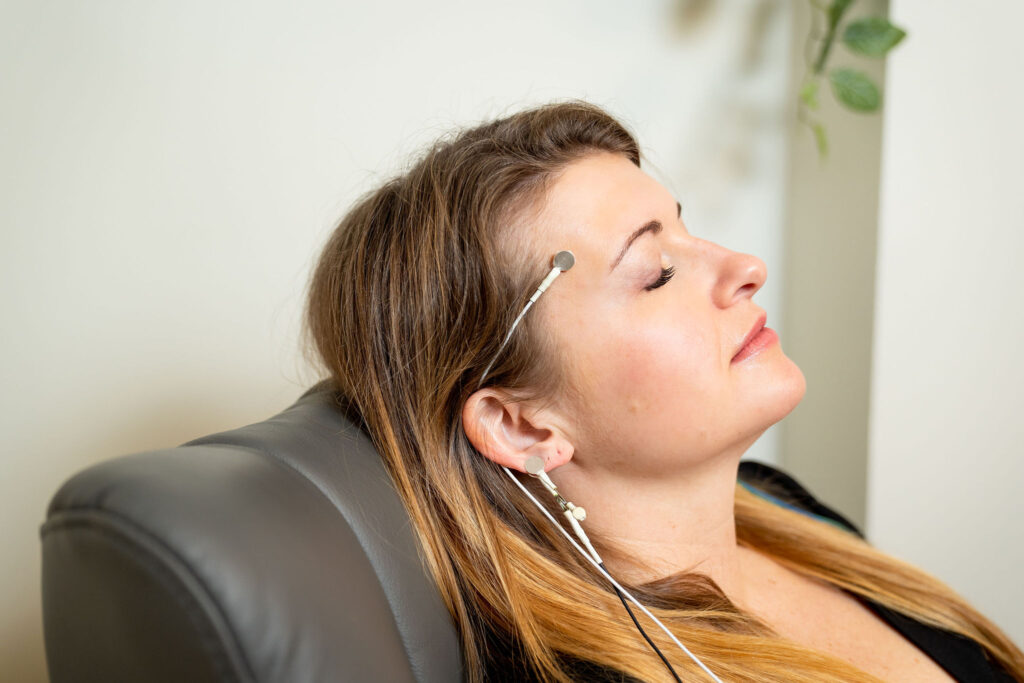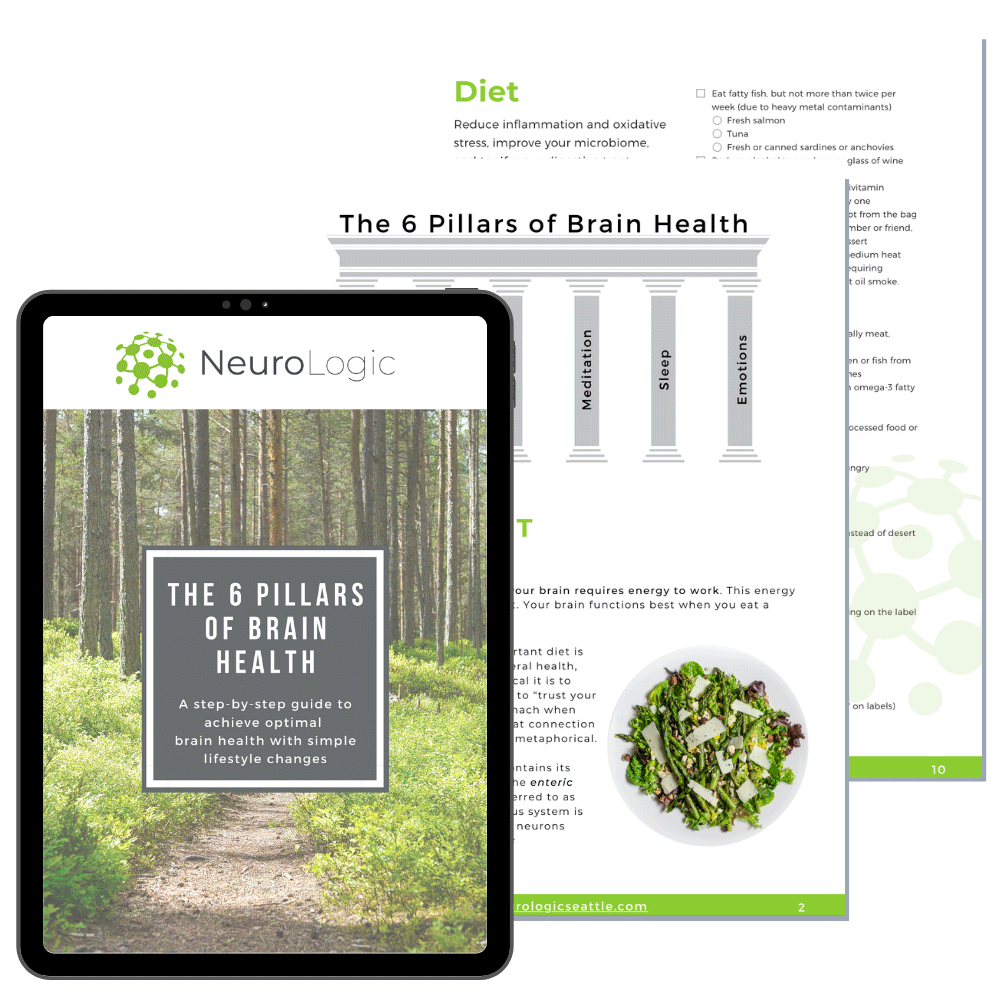Welcome to NeuroLogic Seattle, where cutting-edge neuroscience meets compassionate care. In this article, we delve into the fascinating world of neurofeedback, exploring its underlying principles, its proven efficacy, and the latest studies showcasing its positive impact on mental health and well-being. Join us on this journey as we provide you with a comprehensive understanding of the topic.
Understanding Neurofeedback
Neurofeedback operates on the core principles of brain plasticity and operant conditioning. The brain possesses the remarkable ability to adapt and reorganize itself, forming new neural connections throughout life. By providing real-time feedback on brainwave activity, neurofeedback enables individuals to harness their brain’s natural potential for growth and change.
- Operant Conditioning: Neurofeedback is akin to operant conditioning, where individuals learn through reinforcement. When the brain produces desired patterns or frequencies, individuals receive positive feedback, encouraging the brain to produce more of those patterns.
- Self-Regulation: With our passive neurofeedback technology, individuals can effortlessly learn to regulate their brainwaves. The technology provides direct feedback on brainwave patterns, allowing individuals to naturally adjust into a more balanced and optimized brain state without the need for conscious effort.
- Neuroplasticity: Neurofeedback takes advantage of the brain’s ability to reorganize itself by forming new neural connections and pathways. With regular treatment sessions, the brain can restructure itself, leading to healthier brain functioning and reduced maladaptive patterns, supporting overall mental well-being.
- Optimizing Cognitive Performance: The passive neurofeedback system provides a comprehensive reflection of brainwave frequencies without requiring specific frequency training. This inclusive approach allows the brain to explore its entire activity spectrum, leading to enhanced cognitive performance and mental clarity.
Evidence-Based Benefits: The Clinical Success of Neurofeedback
Numerous studies have demonstrated the efficacy of neurofeedback in various applications, making it a promising therapeutic technique:
- Neurofeedback for ADHD: Research published in the Journal of Neurotherapy found that neurofeedback significantly reduced ADHD symptoms and improved attention and executive functioning in children.
- Natural Anxiety Management through Neurofeedback: A study featured in BMC Complementary and Alternative Medicine (2012) and highlighted the effectiveness of neurofeedback in reducing symptoms of stress and anxiety disorders. This non-invasive approach offers a natural alternative for those seeking anxiety relief.
- PTSD Relief with Trauma-Focused Neurofeedback: The Journal of Neuropsychiatry and Clinical Neurosciences (2012) and another study in the Journal of Pain (2009) showcased how neurofeedback training can reduce symptoms of post-traumatic stress disorder (PTSD) and improved emotional resilience.
- Cognitive Enhancement via Brain Training: The Journal of Neurotherapy (2008) discusses investigations in neuromodulation, neurofeedback, and applied neuroscience, providing insights into the applications and outcomes of these techniques.
Recent Research: The Evolving Success of Neurofeedback Therapy
Recent studies have contributed to the growing body of evidence supporting neurofeedback’s positive outcomes:
Neurofeedback for Fibromyalgia: The study by Nelson et al. (2010) suggests the potential effectiveness of neurotherapy in treating fibromyalgia, providing insights into its application for pain management in individuals with trauma spectrum disorders.
Neurofeedback for Pain in Veterans: The research by Nelson and Esty (2009) focuses on the application of neurotherapy for pain management in veterans with trauma spectrum disorders. This study contributes to the understanding of neurotherapeutic interventions for pain in this specific population.
Neurofeedback for Chronic Headache after Traumatic Brain Injury: The study by Nelson and Esty (2015) explores the use of neurotherapy for chronic headache following traumatic brain injury. This research sheds light on the potential benefits of neurofeedback in addressing persistent headache symptoms in individuals with a history of brain injury.

Advantages of Neurofeedback: From Safety to Cognitive Boost
- The Non-Invasive Advantage of Brain Training: Neurofeedback offers a non-invasive alternative to traditional treatments, reducing the need for medications and invasive procedures.
- Customized Treatment for Individual Brain Patterns: Each neurofeedback session is tailored to the individual’s specific brainwave patterns and needs, ensuring personalized and targeted therapy.
- Brain Performance Enhancement through Neurofeedback: Neurofeedback has been shown to enhance attention, memory, and cognitive flexibility, leading to improved cognitive function and performance.
- Achieving Stress Reduction: Neurofeedback training can promote relaxation and reduce stress levels, fostering a sense of calm and emotional well-being.
- Safe Brain Optimization for Every Age Group: Neurofeedback is safe for individuals of all ages, from children with ADHD to older adults seeking cognitive enhancement.
Discover the Neurofeedback Difference at NeuroLogic Seattle
NeuroLogic Seattle seamlessly integrates cutting-edge research with compassionate care to offer transformative neurofeedback therapies. Our center specializes in harnessing the brain’s inherent potential, utilizing its adaptability to promote cognitive enhancement and mental resilience.
What sets NeuroLogic Seattle apart is our dedication to both the science and the individual. By tailoring neurofeedback sessions to each person’s unique brainwave patterns, we ensure optimal results, catering to diverse needs—from children grappling with ADHD to older adults seeking cognitive rejuvenation.
Our approach revolves around the principles of brain plasticity, operant conditioning, and passive neurofeedback technology. These techniques provide real-time feedback on brainwave activity, allowing for effortless self-regulation, and promoting balanced brain states. Our evidence-backed practices have demonstrated remarkable success in managing various conditions like ADHD, anxiety, PTSD, and insomnia, to name a few.
Engaging with NeuroLogic Seattle opens doors to a world where mental well-being is accessible and achievable. We’re committed to guiding you through every step, ensuring a clear understanding of the processes and expected outcomes. Whether you’re keen on deepening your knowledge about neurofeedback, exploring its benefits for specific conditions, or scheduling a session, our dedicated team is here to assist.
References
Nelson, D.V., Esty, M.L. (2012). “Neurotherapy of Traumatic Brain Injury/Posttraumatic Stress Symptoms in OEF/OIF Veterans.” Journal of Neuropsychiatry and Clinical Neurosciences, 24(2), 237-240.
Nelson, D.V., Esty, M.L. (2009). “Neurotherapy for Pain in Veterans with Trauma Spectrum Disorders.” Journal of Pain, 10(4), Supplement, S18.
Gillham, S., Wold, H., Bayer, Z., et al. (2012). “Low Energy Neurofeedback System (LENS) for Stress, Anxiety, and Cognitive Function: An Exploratory Study.” BMC Complementary and Alternative Medicine.
Cripe, C. (2007). “Effective Use of LENS Unit as an Adjunct to Cognitive Neuro-developmental Training.” Journal of Neurotherapy, 10(2-3), 79-87.
Hammond, D.C. (2010). “LENS Neurofeedback Treatment of Anger: Preliminary Reports.” Journal of Neurotherapy, 14:2, 162-169.
Hammond, D.C. (2008). “Investigations in Neuromodulation, Neurofeedback, and Applied Neuroscience. Clinical Corner.” Journal of Neurotherapy, 11(3).
Nelson, D.V., Esty, M.L. (2015). “Neurotherapy for Chronic Headache Following Traumatic Brain Injury.” Military Medical Research, 2(1), 1-5.
Nelson, D.V., Esty, M.L. (2016). “Neurotherapy as a Catalyst in the Treatment of Fatigue in Breast Cancer Survivorship.” Explore: The Journal of Science and Healing, 12(4), 246 – 249.
- Nelson, D.V., Bennett, R. M., Barkhuizen, A., Sexton, G.J., Jones, K.D., Esty, M.L., Ochs, L. and Donaldson, C.C.S. (2010). “Neurotherapy of Fibromyalgia?” Pain Medicine, 11(7), 912–919.



